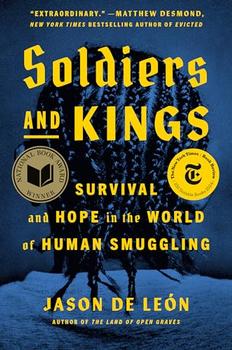Summary | Excerpt | Reviews | Beyond the Book | Readalikes | Genres & Themes | Author Bio

Survival and Hope in the World of Human Smuggling
by Jason De LeónIntroduction
Roberto's murder doesn't warrant much attention. This is not surprising in a place like Honduras, where homicide has become woven into the fabric of daily life. Still, a local newspaper in San Pedro Sula manages to give him three sentences, although it gets his first name wrong:
José [sic] Roberto Paredes died Friday night at Mario Rivas Hospital. Family members reported that he had tried to travel mojado [illegally] to the United States but in Chiapas, Mexico, was stabbed during an assault and admitted to a hospital. After his discharge, he returned to Honduras and a few days later his condition worsened and he was brought to Rivas Hospital, where he died after several days.
The story gets most of the basic details right. Roberto was in Mexico illegally when he was stabbed. He later died in Honduras from his wounds. But he wasn't a migrant headed to the United States, at least not anymore. He'd given up that fantasy a while ago. For the past few years, he'd lived as a street urchin making a little money guiding fellow Hondurans on the Mexican train tracks as they made their way north toward the American dream. What he did for a modest living goes by many names in English and Spanish: smuggler, coyote, pollero, pasador. Interchangeable terms that refer to a person who is paid to help someone get across a geopolitical boundary while avoiding detection by immigration agents. Roberto, like many others in his situation in Mexico, preferred to call himself a guía, a guide: a designation with potentially less negative semantic baggage and one that more directly reflects the work. He is the one you follow, the one who can potentially lead you through danger. The one thing you can't call Roberto is a human trafficker. People who are trafficked have that happen against their will, usually through force, fraud, or coercion. Those Roberto smuggled were willing participants who actively sought him out and paid for his services. I repeat, human smuggler and trafficker are very different things, a concept that popular media and the general public often fail to grasp.Excerpted from Soldiers and Kings by Jason de Leon. Copyright © 2024 by Jason de Leon. Excerpted by permission of Viking. All rights reserved. No part of this excerpt may be reproduced or reprinted without permission in writing from the publisher.
The fact of knowing how to read is nothing, the whole point is knowing what to read.
Click Here to find out who said this, as well as discovering other famous literary quotes!
Your guide toexceptional books
BookBrowse seeks out and recommends the best in contemporary fiction and nonfiction—books that not only engage and entertain but also deepen our understanding of ourselves and the world around us.